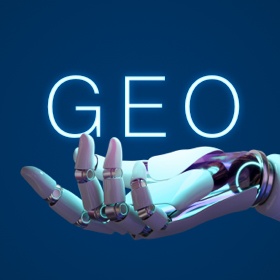The introduction of AI has drastically changed how users find and access information online. Instead of just searching a topic and clicking through the familiar blue links, users can now ask AI models their questions and receive synthesized answers on the spot. Rather than searching for and seeking information, users are asking and being given information.
This shift transforms the landscape of traditional Search Engine Optimization (SEO) into a new era: Generative Engine Optimization (GEO). While ranking high in Google remains a valid strategy that continues to drive website traffic and sales, being referenced in AI-generated answers is a new avenue for brand discovery and visibility.
What's the Difference between SEO & GEO?
Where traditional SEO ensures your website appeals to search engines and end users, GEO focuses on making your content discoverable and citable within AI models like ChatGPT, Gemini, Claude, and Perplexity. As users leverage these tools alongside the traditional Google search bar, optimizing for AI visibility has become a new tactic for additional visibility.
Let's explore the core concepts of GEO and examine the similarities and differences it shares with SEO.
Understanding the Fundamental Shift
Traditional Search: Links and Clicks
In the traditional search model, the journey looks like this: A user inputs a query related to your business. Based on numerous ranking factors (page authority, content quality, technical SEO, etc.), your website appears in the hierarchy of blue links populating Google's results page. The user sees your website, decides to click, and begins reading and browsing your content with the potential of becoming a future customer.
Success in this model =Visibility + Click + Engagement
Generative AI: Direct Answers and Synthesis
In the generative AI model, a user asks an AI model a question related to your business, often including detailed criteria and qualifiers they need to consider. The AI model recognizes your website as a credible source that meets the users’ qualifiers and provides a synthesized answer based on information from your website.
Success in this model = Being the source behind the answer
The Disappearing Click
The biggest difference between these two scenarios is the click itself. Traditionally, users had to click into your website and scan your content to find what they needed. In a generative AI search, they receive an answer upfront without needing to visit your website at all.
This represents both a challenge and an opportunity. While you may lose direct website traffic from users who get their answers through AI, you gain brand visibility and authority when your content is cited or referenced.
What Stays the Same and What Changes?
While the rules of the game may seem flipped, several core principles remain constant in this evolving landscape.
What Stays the Same
Content Remains King
High-quality, relevant content is still the foundation of being discovered online. Whether a search crawler or an AI model is processing your content, substance and value matter. Poorly written or irrelevant content won't succeed in either SEO or GEO.
Authority and Credibility Still Matter
Investing in building a website that's recognized as an authority in your industry remains important for both SEO and GEO. Google's E-E-A-T principles (Experience, Expertise, Authoritativeness, and Trustworthiness) continue to be relevant benchmarks. AI models prioritize sources that demonstrate credibility and expertise when selecting which content to reference.
Understanding User Intent
What is the underlying goal behind a user's query? What are they hoping to accomplish? Whether someone is searching Google or asking Chat GPT, content that accurately answers the "why" behind the query will perform better in both traditional search and AI-generated responses.
Technical Accessibility
Your website and its content must be discoverable, accessible, and processable. For SEO, this means ensuring search engine crawlers can effectively index your site. For GEO, this means presenting content in formats that AI models can easily understand and extract meaningful information from.
What Changes
Context and Meaning
Traditional SEO often focuses on optimizing content for specific keywords and phrases. GEO shifts the focus to helping AI models contextualize your content, so they understand the meaning and relationships between concepts.
Instead of targeting "best running shoes," create comprehensive content that covers the entire topic: how to choose running shoes, what factors matter for different running styles, common mistakes when choosing running shoes, etc.
Clear Content Structure
AI models need to quickly extract and understand information from your content. This means:
- Using clear, concise language
- Organizing information logically with descriptive headings
- Breaking complex topics into digestible sections
- Providing definitions and context for specialized terms
- Including supporting data and specific examples
Well-structured content is easier for both humans and AI to process, so it’s important to structure your content accordingly.
Optimizing for Response Generation
In the world of GEO, content needs to be optimized for AI systems to synthesize information into quick, comprehensive responses. This means:
- Writing quotable, authoritative statements
- Including statistics, data points, and factual claims
- Answering questions directly and thoroughly
- Anticipating follow-up questions within your content
Think of your content as building blocks that AI can reassemble to answer various related queries.
Preparing for Fewer Clicks
Since a percentage of users will receive the information they need from AI without necessarily visiting your website, you'll likely see a shift in traffic patterns. This doesn't mean your content is less valuable; it means you need new ways to measure success:
- Monitor brand mentions in AI responses
- Analyze referral traffic from AI models
- Focus on building authority that leads to deeper engagement
The Evolution of SEO
SEO isn't dead; it's evolving and expanding. Providing a well-optimized experience for users with authoritative information that ranks highly in Google remains valuable and will continue to drive results. But as users shift how they discover information, optimization strategies must shift with them.
The path forward requires a dual approach. Optimizing content not only for human readers and traditional search engines but also for AI models is the next step for SEO. AI models are becoming the intermediary between users and information. The brands that succeed will be the ones that embrace both paradigms.
If you need help navigating this new arena, reach out to our Account Managers who can discuss how JH can help you and your business succeed in GEO.




